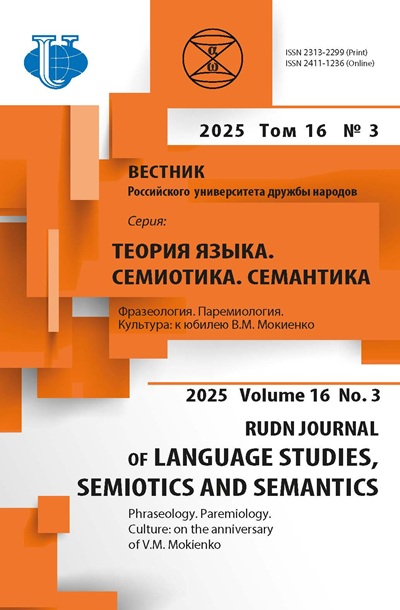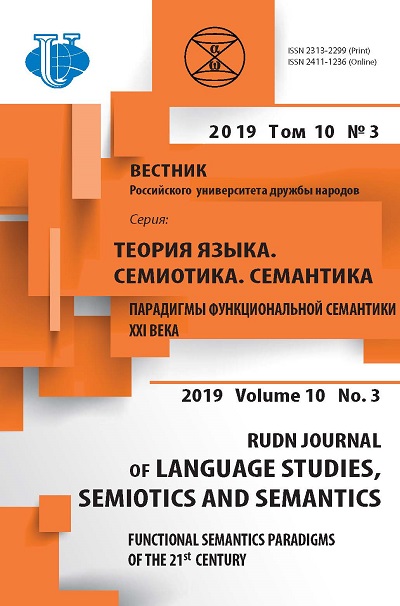Компонентный анализ как микросистема фундаментальных смыслов в произведении У.С. Моэма «THEATRE»
- Авторы: Козлова Л.Я.1
-
Учреждения:
- Военно-космическая академия им. А.Ф. Можайского
- Выпуск: Том 10, № 3 (2019): Парадигмы функциональной семантики XXI века
- Страницы: 687-699
- Раздел: КОНЦЕПТОСФЕРА И ЭСТЕТИЧЕСКАЯ ФУНКЦИЯ ДРАМАТУРГИЧЕСКОГО ТЕКСТА И ДИСКУРСА
- URL: https://journals.rudn.ru/semiotics-semantics/article/view/22126
- DOI: https://doi.org/10.22363/2313-2299-2019-10-3-687-699
- ID: 22126
Цитировать
Полный текст
Аннотация
Целью данного исследования было выявление фундаментальных смыслов в произведении «Theatre» выдающегося британского писателя и драматурга У.С. Моэма. В работе использован концептуальный анализ вербально-семантического и когнитивного уровня языковой (речевой) личности главной героини Джулии Ламберт, с привлечением компонентного анализа лексикографических источников. Компонентный анализ выявленной ЛСГ слов, репрезентирующих концепт «театр», продемонстрировал микросистему смыслов, имеющих в своем фундаменте два основных: LIE/ЛОЖЬ, относящийся к концептосфере театра - TRUTH/ПРАВДА, имеющий отношение к концептосфере реальности.
Об авторах
Лариса Яковлевна Козлова
Военно-космическая академия им. А.Ф. Можайского
Автор, ответственный за переписку.
Email: zyatkova64@mail.ru
кандидат филологических наук; доцент кафедры иностранных языков
Санкт-Петербург, РоссияСписок литературы
- Lakoff D., Johnson M. Metaphors We Live By. Chicago, 1980.
- Conceptual metaphor Режим доступа: http://www.scodis.com/?q=ru/conceptual_metaphor (дата обращения: 08.04.2019).
- Chillton P., Lakoff G. Foreign Policy by Metaphor // Language and Peace / ed. by Ch. Schaffner, A. Wenden. L., N.Y., 2004. P. 37-74.
- Turner M., Fauconnier G. Conceptual Integration and Formal Expression // Metaphor and Symbolic Activity. 2009. No 10 (3). P. 183-204.
- Баранов А.Н. Когнитивные модели в лингвистической семантике // Четвертая международная конференция по когнитивной науке: Тезисы докладов: В 2 т. Томск, 22-26 июня 2010 г. Томск: Томский государственный университет, 2010. Т. 1.
- Будаев А.В., Чудинов А.П. Когнитивная теория метафоры: новые горизонты. Режим доступа: http://elar.urfu.ru/bitstream/10995/18228/1/01-110.pdf (дата обращения: 02.04.2019).
- Чудинов А.П. Россия в метафорическом зеркале: когнитивное исследование политической метафоры. Екатеринбург, 2001.
- Киселёва С.В. Очерки по когнитивной теории концептуальной метафоры // Ученые записки. Том 19: Современные проблемы филологии, межкультурной коммуникации и перевода. СПб., 2012. С. 33-42.
- Козлова Л. Conceptual Metaphor in George Orwell’s Political Dystopia “Animal Farm” // Сетевой журнал «Научный результат». Серия «Вопросы теоретической и прикладной лингвистики». 2016. Т. 2. No 1 (7). С. 23-30.
- Попова З.Д., Стернин И.А. Когнитивная лингвистика. М.: АСТ: Восток-Запад, 2007.
- Скребцова Т.Г. Когнитивная лингвистика: классические теории, новые подходы. М.: Издательский Дом ЯСК, 2018 (Разумное поведение и язык. Language and Reasoning).
- Шишкина С.А. Концептуализация познавательного интереса в русском и английском языках: монография. Тюмень: OST пресс, 2015.
- Аскольдов С.А. Концепт и слово // Русская словесность. От теории словесности к структуре текста. Антология / под ред. В.П. Нерознака. М.: Academia, 1997. С. 267- 279.
- Лихачёв Д.С. Концептосфера русского языка // Известия РАН. Сер. лит. и яз. М., 1993. Т. 52, № 1. С. 3-9.
- Маслова В.А. Когнитивная лингвистика: учеб. пособие. 2-е изд. Мн.: Тетрасистемс, 2005.
- Караулов Ю.Н. Русская языковая личность и задачи ее изучения // Язык и личность. М., 1989. С. 3-8.
- Клобукова Л.П. Феномен языковой личности в свете лингводидактики // Международная юбилейная сессия, посвященная 100-летию со дня рождения академика Виктора Владимировича Виноградова: Тезисы докладов. М., 1995. С. 321-323.
- Солнцев В.М. Язык как системно-структурное образование. С. 11 [Электронный ресурс]. Режим доступа: https://studme.org/81674/literatura/sistema_yazyka (дата обращения: 07.05.2019).
- Мельничук А.С. Понятия системы и структуры языка в свете диалектического материализма // Ленинизм и теоретические проблемы языкознания. М., 1970. С. 43 [Электронный ресурс]. Режим доступа: https://studme.org/81674/literatura/sistema_yazyka (дата обращения: 07.05.2019).
- Гепнер Ю.Р. Очерки по общему и русскому языкознанию. Харьков, 1959. С. 52 [Электронный ресурс]. Режим доступа: https://studme.org/81674/literatura/sistema_yazyka (дата обращения: 07.05.2019).
- Панов М.В. Современный русский язык. Фонетика. С. 6. [Электронный ресурс]. Режим доступа: https://studme.org/81674/literatura/sistema_yazyka (дата обращения: 07.05.2019).
- Maugham W.S. Theatre. CПб.: Корона Принт, Каро, 2007.
- Арутюнова Н.Д. Дискурс // Лингвистический энциклопедический словарь. М., 1990. С. 136-137.
- Самарская Т.Б. Художественный дискурс: специфика составляющих и особенности организации [Электронный ресурс]. Режим доступа: https://docplayer.ru/46587740-Hudozhestvennyy-diskurs-specifika-sostavlyayushchih-i-osobennosti-organizacii-hudozhestvennogo-teksta.html (дата обращения: 17.05.2019).
- Паршин П.Б. Лингвистические методы в концептуальной реконструкции // Системные исследования. М., 1987.
- Ахманова О.С. Основы компонентного анализа / О.С. Ахманова, И.А. Мельчук, М.М. Глушко и др. / под ред. Э.М. Медниковой. М.: Изд-во Моск. ун-та, 1969.
- Macmillan English Dictionary for Advanced Learners. Bloomsbury Publishing Plc, 2006.
- [Электронный ресурс]. Режим доступа: https://dictionary.cambridge.org/ru/ (дата обращения: 07.05.2019).
- Annette Bening, Sherry Turkle, Theatre by W. Somerset Maugham. In search of reality [Электронный ресурс]. Режим доступа: https://rippleeffects.wordpress.com/2010/02/22/theatre-by-w-somerset-maugham-in-search-of-reality/(дата обращения: 07.05.2019).
Дополнительные файлы












